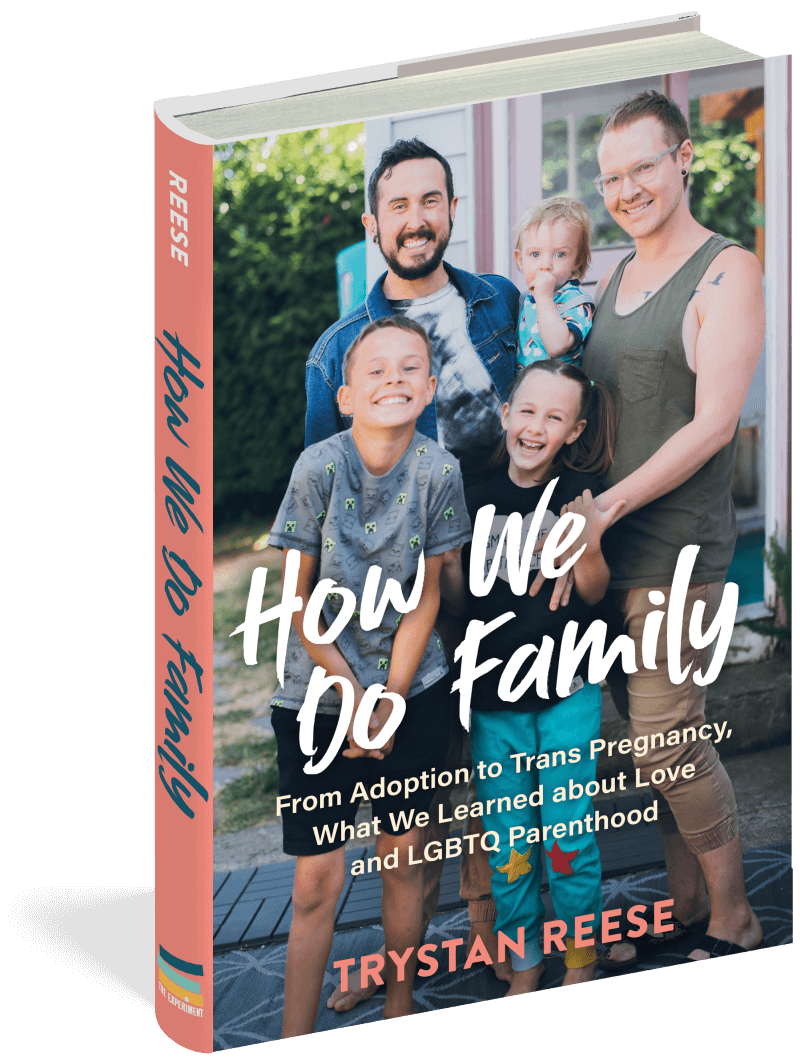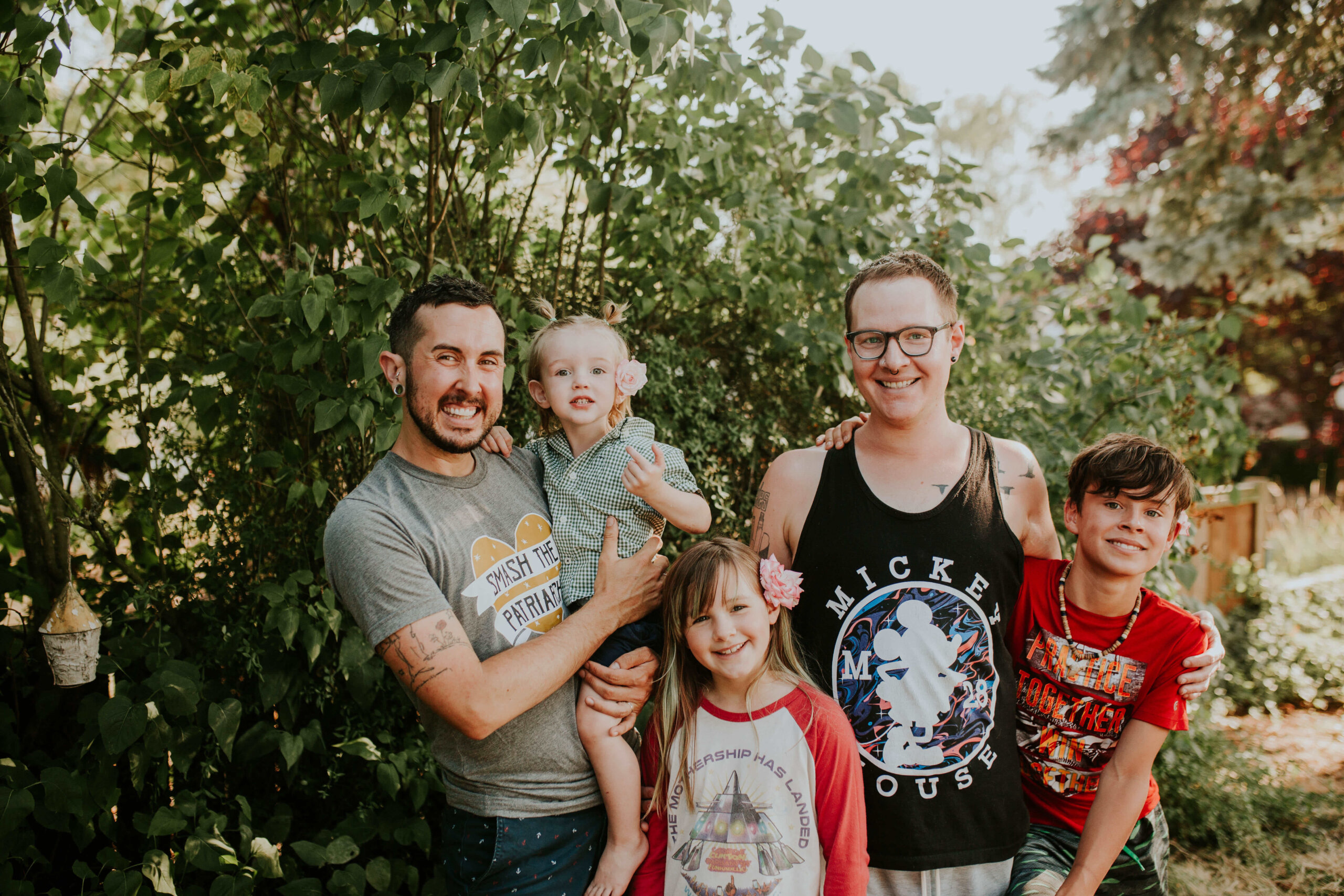After decades of “we’re just like you” messaging from queer parents trying to find acceptance in the cis straight world, Trystan Reese has something to say: We’re not. “So many people assume that queer parenting is radically different than straight parenting and we really put forward the idea that it is—and that that’s a good thing,” Reese tells me over Zoom from his home office in Portland, Oregon.
We’re talking about his first book, How We Do Family: From Adoption to Trans Pregnancy, What We Learned about Love and LGBTQ Parenthood, due out on June 29. Reese’s parenting journey is unique—from an emergency double adoption to carrying a child after transitioning to male. But the book’s themes and lessons, he says, are universal, showing straight and queer parents alike the benefits of approaching child rearing from a queer perspective.
The release of How We Do Family is just the latest in Reese’s foray into the public eye. After the 38-year-old’s pregnancy as a trans man made headlines everywhere from CNN to People in 2017, Reese took the newfound fame and translated it into a brand of trans visibility. The rise in celebrity status was far from glamorous—the transphobic comments hurled at him daily took a toll, and he no longer reads any social media comments or DMs to protect himself. But he and his spouse, Biff Chaplow, still say it’s worth it to share their lives with their five-figure social media following who enjoy peeking into the lives of the couple as they raise their three kids aged 13, 10 and three.
Though he’s not a medical professional, Reese has also become one of the most prominent names among trans pregnancy experts. He is the founder of Trans Fertility Co., a resource hub for trans pregnancy, and is featured in the new PBS NOVA short film Fighting for Fertility. After spending two and a half years as the director of family formation at LGBTQ2S+ family non-profit Family Equality, he took a leap of faith and quit his day job mid-pandemic to work full-time on his own consulting company, Collaborate Consulting.
“Straight people have been interested in how we approach parenting as people who didn’t inherit a model for how to do it.”
Chaplow and Reese’s first two children came to them suddenly when Chaplow’s sister’s home was deemed unfit. The couple stepped up and took in their niece Hailey and nephew Lucas, eventually adopting them outright. Years later, to conceive their now-preschooler Leo, Reese stopped taking testosterone. Even though he had incorrectly been told in his 20s that the physical transition he was embarking on would render him infertile, this wasn’t the case—and it isn’t for most trans men.
“What’s been most interesting as we’ve told our story in myriad ways over the years is how many straight people have been interested in and attracted to and curious about the way that we approach parenting as people who didn’t really inherit a set model for how to do it,” Reese says. That’s what his book aims to explore: what it means to parent when you get to write your own playbook.

Credit: Workman Publishing
Reese has embraced his role in evangelizing the benefits of queer parenting to all. For one, he coaches the straight cis moms in his due date group on how to ask for help, how to be honest about their feelings and how to accept help when it’s offered—all of which Reese feels is part of queer culture. “For so long, we were all we had,” Reese says, noting that mutual aid is something queer people are generally more comfortable with than straight people. Reese knows that straight cis moms have a tough time admitting when things aren’t okay and when they need a hand or a break, but they haven’t been socialized to feel comfortable saying it out loud or asking for help.
“Maybe the reason why so many straight men were terrified of our story is because we prove that society may not actually need straight men at all,” Reese jokes. When parents are liberated to throw out oppressive gender roles, it becomes clear that there is nothing about someone’s sex or gender or sexuality that makes them more or less capable of doing the work of parenting—whether it’s emotional labour or doing the laundry. Following a queer parenting model, Reese argues, cis straight men can and should be doing these things too, without excuses.
Reese believes queer parenting is more equitable because instead of assigning tasks based on gender expectations, the division of labour falls to the best individual fit. In his household, Chaplow absolutely despises laundry, so that task falls to Reese based on their agreement of dividing up the work of the household. Reese hates grocery shopping, so that’s Chaplow’s job. There isn’t the same weight of generations of trans gay parents with a mix of adoptive and biological kids doing things the same way for centuries, because our family formations haven’t existed on the same scale for that long.
“Someone’s gender or sexuality does not make them more or less capable of doing the work of parenting.”
Reese fell into being an author much like he fell into becoming a parent: He never set out to write a book, and he resisted the opportunity when it arose (and he still doesn’t yet feel comfortable owning the label of “author”). He first declined a literary agent’s offer because, as a high-school and college dropout, he didn’t think he was capable of writing more than Instagram captions. After some convincing, he hired a ghostwriter to craft the pitch to a publisher. Once the proposal was accepted, he began to realize that maybe he was capable of writing a book after all.
But that process wasn’t an easy one. In fact, “it was horrible,” Reese admits. Writing a book is hard work and when it’s personal it can be painful. “It was really, really hard to go through all the worst things that have happened to me and think, ‘How can I describe this situation in one sentence or less?’” Reese opened up his wounds to pour them out on the page, like divulging the ache around the miscarriage he experienced before becoming pregnant with Leo.
He thought getting edits back would be just as awful: “After the traumatic experience of having my pregnancy story go viral and being the target for so much brutal transphobia, I’ve just been so much more tender than I have been in many years.” But instead of being re-traumatizing, getting edits back was the best part of writing the book. Instead of the rejection he feared, Reese was met with constructive edits he wholeheartedly agreed with and felt empowered through the collaborative relationship with his editor.
The final product is a love letter to queer culture and queer strength and what people of any gender or sexuality can learn from it. How we do family is valuable and, as Reese says, writing our own playbook is a good thing.
How We Do Family: From Adoption to Trans Pregnancy, What We Learned about Love and LGBTQ Parenthood by Trystan Reese is currently available for pre-order and will be available wherever books and e-books are sold on June 29, 2021, from The Experiment.


 Why you can trust Xtra
Why you can trust Xtra


